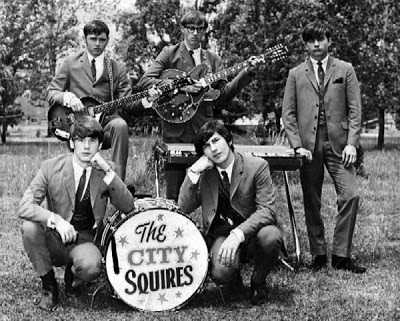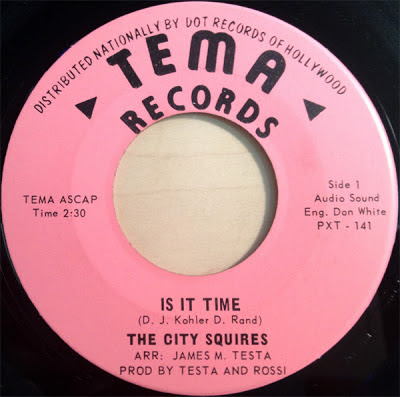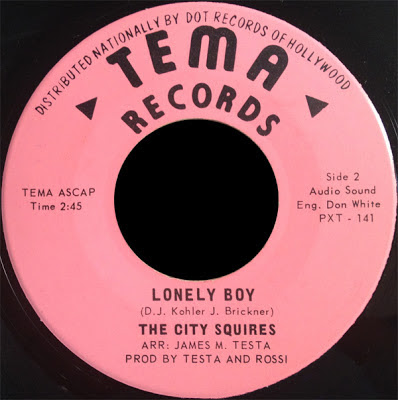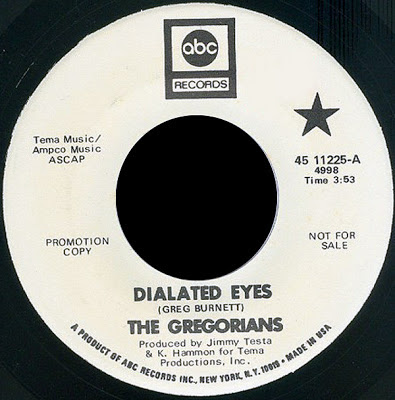The City Squires got started in 1963 as The Jaguars (named after the car) when a couple of 12-13 year old kids from the southern Cleveland suburb of Parma, Ohio, decided to get together and form a garage rock band. The original members were 13 year old Jim Brickner on guitar and 12 year old Roland Solomon on bass (who reportedly had the gift of perfect pitch). They added a drummer named Tom Sitzler. A few weeks later, Tom Kent from nearby Middleburg Heights came on board to handle lead vocals and rhythm guitar. Shortly afterward, drummer Tom Sitzler split from the band and was replaced by Tom Kent’s friend, Dale Zack.
The Jaguars took their act to the streets and gathered up some fans. In June 1965, inspired by one of the biggest local band at the time, the guys decided it was time to cut some records. So they hooked up with The Baskerville Hounds manager, James M “Jimmy” Testa, and got into the Audio Recording studios to lay down some tracks. They recorded a cover of Jenny Jenny by Little Richard, and a couple of original tunes, including one Jimmy Testa wrote called Laurie and an instrumental penned by Roland Solomon. Jimmy Testa messed around with some interesting production techniques on that instrumental and ended up giving it a new name, Russian Ho-Ho. Jimmy convinced the guys to change their name to The City Squires and pressed up a couple hundred copies of Jenny Jenny b/w Russian Ho-Ho on his Tema label. (I know this is hard to believe, but I don’t happen to own that record! If you know where I can get my hands on a copy of Tema 136, or at least a recording of these two songs, I’d love to hear from you! I’d especially love to hear that orphaned recording of Laurie.)
Just one year later, in June 1966, the guys were back in the studio recording three tracks, Child Of Our Times, I Want Your Girl, and Parma Polka, which was inspired by local Friday night horror movie host Ghoulardi (Ernie Anderson) on WJW-TV 8 who used to love picking on that suburb for it’s Polish population, which he referred to as “A Certain Ethnic” population, and the pink flamingo statues found in front yards all over the city.
Parma Polka was more of a rocking polka, partly inspired by the song Gloria by Them, where the band spells out P-A-R-M-A instead of Gloria’s name, and riffs from other current hits such as Day Tripper by The Beatles and Time Won’t Let Me by Cleveland’s Outsiders. They made an acetate pressing of Parma Polka b/w I Want Your Girl and gave it to Ghoulardi for possible use on his show, along with the many other cool records he liked to use which included Who Stole The Keeshka by Frankie Yankovic His Yanks. But Ernie Anderson was leaving Cleveland for a very successful voiceover career in Los Angeles, to be replaced by Big Chuck and Hoolihan, with Hoolihan later being replaced by Little John. A guy named Ron Swede, who called himself The Ghoul, picked up much of Ghoulardi’s schtick when he began hosting movies on Saturday afternoons on another station. The Ghoul made extensive use of the Parma Polka on his show. (Again, I don’t have a copy of this recording, but I’d love to get one. It may have been credited to The Esquires instead of The City Squires, but I’m not certain of that. I’d especially love to hear the flip side of that acetate, I Want Your Girl, which I hear is a garage rocker featuring some nice guitar work by Jim Brickner and a melody similar to Beg Borrow And Steal!)
Co-founder and bass guitarist Roland Soloman left the band and was replaced by a guy named Greg Burnett from The Canterburys. Greg could play sax and trumpet and was a good vocalist, but he really had to fake his way along as a bass player. The City Squires were a bit upset by the way things were going so they decided to break up for a while. A few months passed before Jim Brickner and Greg Burnett assembled a new band. Still using the name The City Squires, they joined forces with another band from Parma called The Set LTD, which included Jerry Colvin on keyboards and Gus D’Angelo on bass. They also picked up Bill McCracken from the Canterburys to handle the drums. Greg Burnett became the lead singer for the new City Squires and also got a chance to pick up his sax and trumpet for a change.
Practice makes perfect, and boy did these guys practice together! They became close friends and practiced together several hours every day. After practice, they might go out for a gig that same night and play together for several more hours! What if you throw a party and nobody comes? That’s what happened one night when the City Squires were booked together with The James Gang at a place called the Painesville Armory just east of Cleveland. The event was hosted by a disc jockey from WIXY 1260 in Cleveland, but only a few people showed up! The guys decided to do an extensive jam session together.
The City Squires built a repertoire of over 500 songs. Fresh out of High School, they played at places as far west as Cedar Point, as far east as the clubs of Erie, Pennsylvania, and many places in between, including the Playboy Lounge, and the Columbia Ballroom. They became members of the Cleveland Musicians Union, which paid off for them on occasion when a club owner would try to stiff them on their fees. The guys put on a heck of a good show. They’d do some crazy stuff like auctioning themselves off for a dance with the girls who could scream the loudest. Sometimes Greg would take over playing the other guys’ instruments, including the drums, right in the middle of a song without missing a beat!
They made their way back into the recording studio in 1967 to record Is It Time and Lonely Boy. Here’s Is It Time by The City Squires on Tema 141 from 1967:
And here’s the flip side, Lonely Boy:
Both songs got some spins on Cleveland radio and ended up selling several hundred copies around town. They also got a chance to lip sync to Lonely Boy on Big Jack Armstrong’s TV show. The show’s producer accidentally started the record at the wrong speed and the guys frantically tried to make it work anyway. Big Jack made them suffer by keeping it going at 78 RPM for an uncomfortably long time. During that same recording session in 1967, Jim Brickner wrote a theme song for the band and put it on a record for use every time they opened or closed one of their shows.
After an argument in 1968, Jim Brickner left the band for a few weeks. The rest of the guys got together and did a gig at Cain Park using the name Pye Jones And The 28th Day Ragtime Band, probably a takeoff on Sgt. Pepper’s Lonely Hearts Club Band.
They went on to write and record even more songs, gradually getting even better and better over time. In 1968, drummer Bill McCracken was replaced by Pete Naster, then by 15 year old Bob Dillinger. In 1969, ABC Records got hold of their demo and the result was a visit by Bill Symzyck and a four-single recording contract. However, the label felt that the name City Squires sounded too dated and turned them into The Gregorians. The band wasn’t thrilled with the new name, so it was only used on one record, a tune called Dialated Eyes b/w Like A Man.
Here’s Dialated Eyes by The Gregorians on ABC 11225 from 1969:
To promote this record, the guys did an interview on WMMS-FM, which was a new progressive rock station in Cleveland at the time (and where I would end up working a few years later).
The band finally called it quits in 1970. Greg Burnett went into the Air Force. Richard Solomon played bass for the Baskerville Hounds for a while, then got back together with Tom Kent in a band called Raintree, which also featured Bob Dillinger on drums.
Jim Brickner, Greg Burnett, Roland Solomon reunited in 1979, pulling in Doug McCutcheon from The Baskerville Hounds on keyboards and Tom Napier on drums. They played some local clubs for a while, but didn’t make any more records.
A lot of the music you’ll hear on MusicMaster Oldies came from records that were big hits in just a single city back in the 1960’s. I’ve found many of these records by traveling all over the world and visiting as many vinyl record stores and record shows as possible. I’ve also collected a whole bunch of radio station surveys. Songs that appear on these surveys that never appeared on the Billboard Hot 100 national charts are often very good. In most cases, they simply never got the promotion needed to launch them into the national spotlight back in those days before the Internet leveled the playing field for local talent and allowed them to publish their own material for the whole world to enjoy. Still, it’s all about promotion. The world may be able to hear your songs on YouTube or buy them on iTunes, but people still have to find them first! You’ll hear thousands of local and regional hits on MusicMaster Oldies. It’s like taking a trip around the world in a a time machine!




